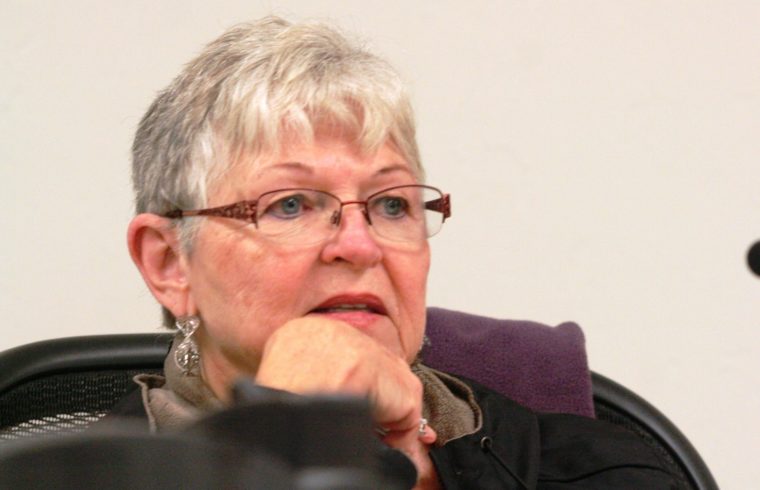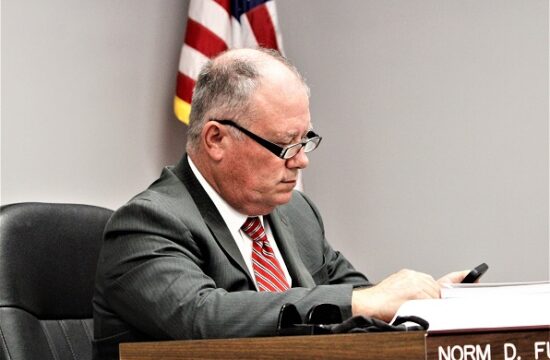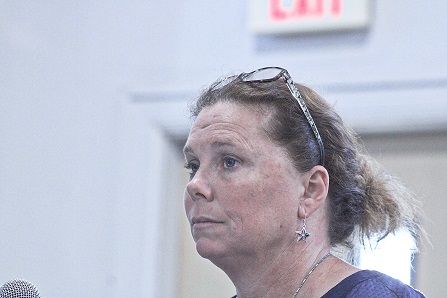County Commissioner Lilly Rooks expressed strong opposition to the consent agenda proposal.
By Terry Witt – Spotlight Senior Reporter
Levy County Commission Chairman Matt Brooks failed Tuesday to gain board approval of his plan for creating a consent agenda to shorten meetings.
Audience members expressed fierce opposition to the proposal.
Brooks, in his first meeting as the chair, said clustering routine agenda items together and approving them with a single vote would allow more time for a deeper discussion of other bigger issues.
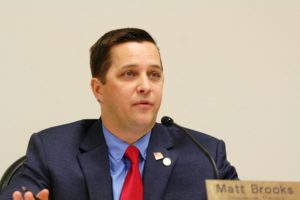
He said approving expenditures, minutes, grants, and other less important agenda items in the consent agenda would free supervisors to return to work and give the board more time to discuss issues of greater importance.
The audience and his fellow commissioners opposed the plan.
Brooks immediately ran into stiff opposition from Commissioner Lilly Rooks who said she had zero interest in a creating a consent agenda to shorten meetings and save the board time.
“We’re here to represent the people. Our time is given to them. If it takes a half a day to go through the agenda, so be it. If it takes more than that, so be it,” Rooks said.
Resident Kim Wheeler suggested moving staff agenda items toward the front of the meeting to avoid forcing supervisors to sit through a lot of business items that had nothing to do with their work. She said she had held supervisory positions and understood the importance of not wasting staff time.
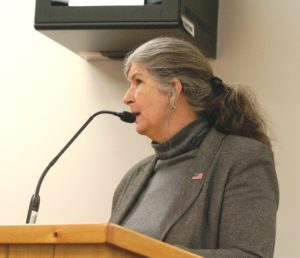
But Wheeler didn’t like the idea of using a consent agenda to cluster items for a single vote. She said she would like to hear about grants and other matters that Brooks wanted to place in a consent-agenda.
“Sometimes it helps us to hear what those grants and things are about,” she said.
Renate Cannon, who was born in communist East Germany and fled to the United States to experience Democracy, was strongly opposed to Brooks’ proposal to establish a consent agenda.
Cannon commended Rooks for the stand she took in opposition Brooks proposal.
“I want you to know you are not volunteers. You are being paid for what you are doing. November is coming. A number of you are up for election,” she said. “I am a naturalized citizen of this country because I grew up in communist Germany. I did want to see some Democracy, which is getting thinner by the day in this country.” (audience applause)
Cannon said she and her husband Barney attended Suwannee River Water Management District meetings in Live Oak until the agency implemented a consent agenda that shut down public comment.
“You didn’t have a source to say a peeping thing,” she said. “If that is what is going to happen here, well, November will come and that’s all I have to say.”
Brooks said shutting down public comment wasn’t his goal. He said any member of the county commission, the county attorney or county coordinator could pull an item off the consent agenda for discussion.
“I’m not looking to railroad 15 things under one item. I think I clearly stated that. I don’t want to be seen as communist East Germany,” he said.
Spotlight Founder Linda Cooper said the audience had received valuable information earlier in the meeting about an emergency communications system grant when 911 Director Mike West made a presentation to the board. Brooks had used West’s presentation as an example of something that could have been clustered in a consent agenda with other routine business.
The grant is intended to foster better emergency communications between the county and cities. The Levy County Sheriff’s Office currently can’t communicate directly with Williston police in emergencies. The sheriff’s office must contact Williston dispatchers and let them contact city police. The grant gives the county new software to directly communicate with Williston police and other city departments, as required by the Marjory Stoneman Douglas Act. The law was triggered by the Parkland, FL school massacre. When the killing spree was in progress, not all city police departments were able to directly communicate with the sheriff’s office about events transpiring at the school.
A consent agenda would have allowed the communications grant discussed by West and commissioners at Tuesday’s meeting to be grouped together with other agenda items the chairman felt weren’t of great importance and could be approved by a single vote.
Spotlight Founder Linda Cooper said she has long opposed the creation of a consent agenda. She said she has fought against it for years. She said county commission meetings could be made more efficient by having staff make their presentations early in the meeting or as the last thing in the meeting. Staff reports would have an assigned time.
“If you’re not going to have discussion, why bother doing this. If you want to argue Home Rule, you’re throwing it out the window by doing this consent agenda. (audience applause).
Brooks shook his head indicating he disagreed.
“I am,” Brooks said, indicating he was disagreeing by shaking his head. “I’m going to disagree with you. That’s not the goal.”
Cooper responded, “We hardly ever go past the noon hour with these meetings. We spend three hours here and that’s it for the meeting, so it’s not the time.”
“But to have a consent agenda will not work and we have fought this tooth and nail. I take this as a slap in the face. (audience member said “Amen”). We have told you over the years we do not want a consent agenda and your first piece of business is to shove this down our throats. This is wrong.”
Resident Robbie Blake said she agreed with Rooks opposition to a consent agenda.
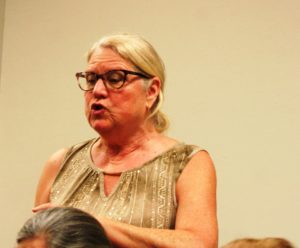
“I think there’s a danger. This format has worked well for many years. Let’s face it everyone that comes here is working on taxpayer dollars. Their time, whether it’s an hour or two hours is not wasted, especially when we get more information on historical buildings or what monies are being spent – I just don’t like the idea because it looks just political to rush everything together and keep out the commentary. There are ways to be efficient without creating a whole new system.”
Brooks said his primary goal in restructuring the agenda was to hear ideas from the public and from his fellow board members.
“It was not my goal to ram something down someone’s throat; it was to hear from the public. I have heard from the public. I have heard that and I think there are ways to work around it. I think that’s how government should work, an exchange of ideas and not just don’t do that and this is why…and I heard the why,” he said.
The board adopted three of Brooks’ agenda-related proposals that weren’t connected to the consent agenda. They voted to have a roll call of commissioners at the start of the meeting. Commissioners agreed to add an early segment to the agenda during which additions, deletions and changes could be made to the agenda, a procedure used by Williston City Council. They agreed to hear proclamations and presentations as the next step in the agenda and public comment to follow.
At Brooks’ request the board instructed County Attorney Anne Bast Brown to tweak a rule in a 2013 resolution that established county commission meeting procedures. The proposed change would continue to allow the public to discuss any subject at the start of the meeting and at the end of the meeting. Brooks said the 2013 resolution said the public could only discuss agenda items in the first public participation segment, but the rule was never followed. He said the public has always enjoyed the freedom to comment on any subject at the start and at the end of every meeting.
Commissioner John Meeks suggested the board establish 10 a.m. as the time when staff supervisors would give their presentations to the board. He said that would give them time to go back to work. He said he wasn’t trying to throw Brooks under the bus but he felt setting a firm time when supervisors brought their business to the board would avoid letting them sit through the first hour of the meeting without anything to do. The board took no action on the suggestion.
It was Meeks that made the motion to approve changes to the structure of the agenda minus any mention of the consent agenda. He said he wasn’t in favor of the consent agenda proposal the way it was worded.
Brooks, in his first meeting as chairman, allowed public comment to flow throughout the meeting.
———————
Board of County Commission Regular Meeting January 7, 2020; Posted January 7, 2020


